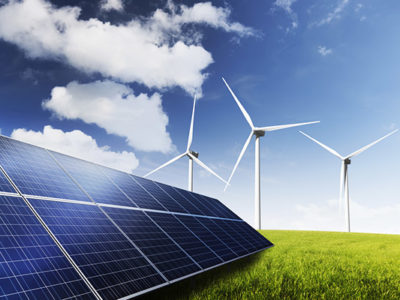Using Emergency Powers to Fight Climate Change
If Trump can stretch emergency powers, maybe they can be used for other purposes too.
Could a future President invoke emergency powers against climate change?
Republicans are apparently worried that if Trump could use emergency powers by declaring border security a national emergency, the next president could do the same thing for climate change. There’s no doubt that this would be far more legitimate than Trump’s wall effort. Border crossings are much lower than they were ten years ago; he has said in the recent past that his prior efforts have vastly improved border security. In contrast, the Pentagon has classified climate change as a threat to national security, and Congress under Republican control has even endorsed this view. Furthermore, scientists have made it clear that we have a limited time to head-off a disastrous outcome.
With that in mind, I did some quick research to see what powers a President might have to take emergency action against climate change. This doesn’t mean I think it’s a good idea, either for Trump or for future President X. But if the courts uphold Trump’s use of emergency powers, some might well think that turnabout would be fair play.
One immediate possibility would be to use the same power that Trump is considering in order to divert military construction funds to other uses – in this case, perhaps building wind or solar farms or new transmission lines. But what else could President X do?
The Brennan Center has compiled a helpful list of almost 150 statutes giving the President special powers during emergencies. The list doesn’t map the outer perimeter of presidential powers – there are other laws that give Presidents powers to take action on the basis of national security, and the President also has some ill-defined, though not unlimited, powers to take action without explicit congressional authorization. But the list provides a good start. Since this issue has come up so recently, I can’t claim to have researched the statutes on the list in any depth, but my “prospecting” effort was enough to identify some promising areas for further exploration.
Here are some of the possibilities:
- Oil leases are required to have clauses allowing them to be suspended during national emergencies. (43 USC 1341) If climate change is a national emergency caused by fossil fuels, then suspension seems like a logical response.
- The President has emergency powers to respond to industrial shortfalls in national emergencies. (50 USC 4533). This could be used to support expansion of battery or electrical vehicle production. Another provision allows the President to extend loan guarantees to critical industries during national emergencies. (50 USC 4531). This could be used to support renewable energy more generally.
- The Secretary of Transportation has broad power to “coordinate transportation” during national emergencies. (49 U.S.C 114). This might allow various restrictions on automobile and truck use to decrease emissions of greenhouse gases.
- The President may invoke the International Emergency Economic Powers Act to deal with “any unusual and extraordinary threat, which has its source in whole or substantial part outside the United States.” (50 USC 1701-1707).That description certainly applies to climate change. According to the Brennan Center, this Act “confers broad authority to regulate financial and other commercial transactions involving designated entities, including the power to impose sanctions on individuals and countries.” Conceivably, these powers could be deployed against companies or countries trafficking in fossil fuels.
There may well be others on the Brennan Center list that I missed. Moreover, as I said above, the President has other powers relating to national security, statutory and otherwise, that aren’t keyed to a declaration of national emergency – for instance, the kinds of tariffs Trump has imposed on foreign goods (say those relating to oil and gas drilling, or to oil imports.)
You might well respond that using these various powers to deal with climate change is stretching them far beyond any reasonable understanding of congressional intent. But if the courts upholds Trump’s action, that will be a sign that they’re not willing to apply any meaningful oversight to presidential actions.
Granting the President broad emergency powers threatens to damage our system of checks and balances. Their use should be reserved for cases where a situation is unfolding too quickly or unpredictably to allow a legislative response. But if Trump does end up using emergency powers to build his wall, without congressional or judicial check, we may find ourselves in a situation where pretty much anything goes. If so, it may be increasingly hard to argue that one side of the political divide should unilaterally disarm.
Reader Comments
3 Replies to “Using Emergency Powers to Fight Climate Change”
Comments are closed.







Isn’t it part of the basic definition of an “emergency” that it be unexpected or sudden? Climate change meets neither of these criteria. Likewise, an “emergency” is generally understood to be of finite duration, even if prolonged (like a war). Given that climate change will persist for the foreseeable future, and that the climate crisis will outlive our grandchildren (at least), it seems to fail this test for an emergency as well.
I fear that invoking emergency powers to deal with a problem that nobody alive will see the end of (something you’re just imagining, not advocating, I know) would be a great stride down the road away from democracy.
That’s his point, though. While you’re right about what “emergency” means, the situation at the border obviously doesn’t meet that definition either (Even if you buy Trump’s false rhetoric and believe it’s a crisis, it’s not unexpected or sudden.) So, if a court upholds it, that means that courts are basically giving the president unlimited discretion to define “emergency.”
Look into California itself by resolving climate con exploitation, abuse, scams, fraud, deception, kleptocracy, & malfeasance, while exposing environmental health issues, ecosystem destruction, watershed alteration & resource overextraction, beside individual injury & injustice. The ineffective fraudulent cap-&-trade scam rife with misappropriation & malfeasance, while subsidized, externalizing costs & damages, evading accountability also for imposing risks & hazards, causing catastrophe & disasters.